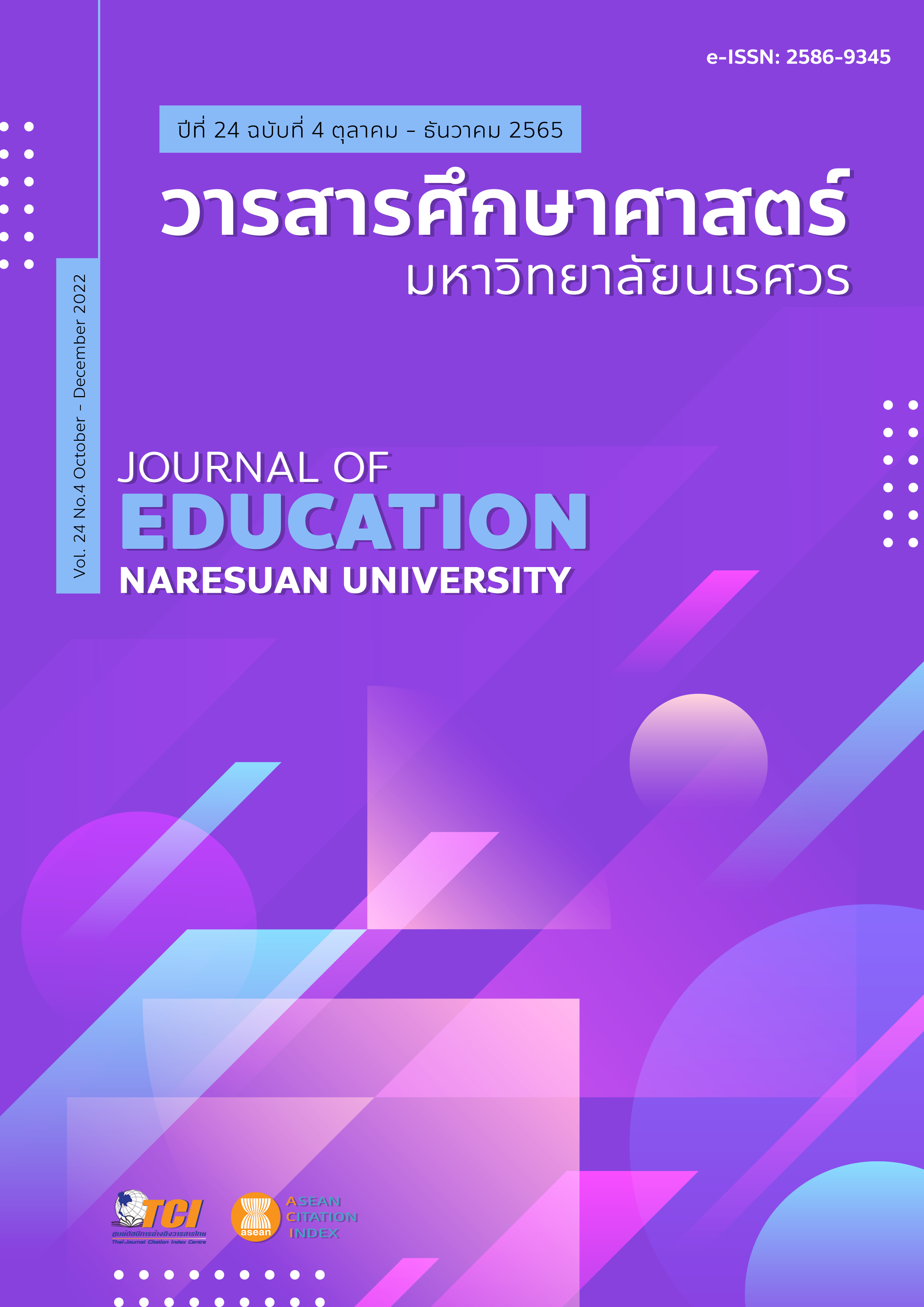THE DEVELOPMENT OF AN ASSESSMENT SYSTEM FOR AFFECTIVE DOMAIN BEHAVIOR IN ONLINE LEARNING การพัฒนาระบบประเมินพฤติกรรมด้านจิตพิสัยในการจัดการเรียนการสอนออนไลน์
Main Article Content
Abstract
Currently online learning is becoming more popular, especially in unusual situations due to the covit-19 epidemic. Measurement and assessment of learners in affective domain usually measure by observing the learners. Unfortunately, this method cannot apply with online learning because teachers and students do not actually meet face to face. The purpose of this research is to develop a system for assessment affective behavior in online learning by analyzing the data in a log file. The system analyzes and displays student behavior in 3 areas: responsibility, interest of teaching media and participation in online classrooms. The system presented the number of times and the percentage of progress. In addition, it has ability to assess the affective score and compare it with the average of the entire course. The usability evaluation results of the system indicated that the affective behavior assessment system for online learning was at a good level.
Article Details

This work is licensed under a Creative Commons Attribution-NonCommercial-NoDerivatives 4.0 International License.
The owner of the article does not copy or violate any of its copyright. If any copyright infringement occurs or prosecution, in any case, the Editorial Board is not involved in all the rights to the owner of the article to be performed.
References
Ahmad, N. B., Ishak, M. K., Alias, U. F., & Mohamad, N. (2015). An approach for e-learning data analytics using SOM clustering. International Journal of Advances in Soft Computing & Its Applications, 7(3), 94-111.
Alias, U. F., Ahmad, N. B., & Hasan, S. (2015). Student behavior analysis using self-organizing map clustering technique. ARPN Journal of Engineering and Applied Sciences, 10(23), 17987-17995.
Bovo, A., Sanchez, S., Héguy, O., & Duthen, Y. (2013). Clustering moodle data as a tool for profiling students. 2013 Second International Conference on E-Learning and E-Technologies in Education (ICEEE) (pp. 121-126). doi: 10.1109/ICeLeTE.2013.6644359.
Carmona, C. J., González, P., Jesus, M. J. D., & Ventura, S. (2011). Subgroup discovery in an e-learning usage study based on moodle. Proceedings of the 2011 7th International Conference on Next Generation Web Services Practices, NWeSP 2011. 10.1109/NWeSP.2011.6088221.
Charoentum, B. (1997). Construction of an affective domain observation from in chemistry for mathayom suksa 5 students (Master of Education). Chingmai: Chingmai University. [in Thai]
Comendador, B. E. V., Rabago, L. W., & Tanguilig, B. T. (2016). An educational model based on knowledge discovery in databases (kdd) to predict learner's behavior using classification techniques. 2016 IEEE International Conference on Signal Processing, Communications and Computing (ICSPCC) (pp. 1-6). doi: 10.1109/ICSPCC.2016.7753623.
Conijn, R., Snijders, C., Kleingeld, A., & Matzat, U. (2017). Predicting student performance from LMS data: A comparison of 17 blended courses using moodle LMS. IEEE Transactions on Learning Technologies, 10(1), 17-29.
Massart, F. (2018). Level up! - gamification. Retrieved August 15, 2020, from https://moodle.org/plugins/block_xp
Harvard University, & Massachusetts Institute of Technology. (2016). MOOCs. Retrieved Aug 15, 2020, from http://mooc.org/
Kirakowski, J., & Corbett, M. (1993). SUMI: the Software Usability Measurement Inventory. British Journal of Educational Technology, 24(3), 210-212.
Kularbphettong, K., & Tongsiri, C. (2012). Mining educational data to analyze the student motivation behavior. International Journal of Computer, Electrical, Automation, Control and Information Engineering, 6(8), 1036-1040.
Manne, S., Yelisetti, S., Kakarla, M., & Fatima, S. (2014). Mining VRSEC student learning behaviour in moodle system using datamining techniques. International Conference on Computing and Communication Technologies (pp. 1-7). doi: 10.1109/ICCCT2.2014.7066695.
Namburi, S. (2006). Approaches to ethical assessment supporting learner’s achievement through e-learning system. Journal of Yala Rajabhat University, 1(2), 138-155. [in Thai]
Namburi, S. (2009). Development of system supporting ethical behavior assessment and improvement for learner’s responsibility in electronic learning environment (Doctor dissertation). Bangkok: King Mongkut’s University of Technology North Bangkok. [in Thai]
Nasritha, K., Angskun, J., & Angskun, T. (2020). Factors analysis of affective assessment in electronics education. Suranaree Journal of Social Science, 14(1), 1-24. [in Thai]
Navawongsathien, A. (2009). Assuring quality in e-learning: The challenging of no-boundary learning. Journal of Education Burapha University, 20(3), 47-62. [in Thai]
Phongsiri, W., Jansopha, U., & Puangpronpitag, S. (2014). e-learning log analysis for behavioral scoring. Journal of Science and Technology Mahasarakham University, 10(Special Issue), 121-131. [in Thai]
Promwong, B. (1999). The construction of an affective domain test in Buddhism (S 0113) course for junior secondary school curriculum, B.E. 1978 (Revised Edition 1990) (Master thesis). Maha Sarakham: Mahasarakham University. [in Thai]
Ritcharoon, P. (2017). Principles of measurement and evaluation of education (11th ed). Bangkok: House of Kermist. [in Thai]
Romero, C., González, P., Ventura, S., Jesus, M. J. D., & Herrera, F. (2009). Evolutionary algorithms for subgroup discovery in e-learning: A practical application using moodle data. Expert Systems with Applications, 36(2), 1632-1644.
Ruiz, J. S., Díaz, H. J. P., Ruipérez-Valiente, J. A., Muñoz-Merino, P. J., & Kloos, C. D. (2014). Towards the development of a learning analytics extension in open edX. Proceedings of the Second International Conference on Technological Ecosystems for Enhancing Multiculturality (pp. 299–306). https://doi.org/10.1145/2669711.2669914.
Sisovic, S., Matetic, M., & Bakaric, M. B. (2016). Clustering of imbalanced moodle data for early alert of student failure. 2016 IEEE 14th International Symposium on Applied Machine Intelligence and Informatics (SAMI) (pp. 165-170). doi: 10.1109/SAMI.2016.7423001.
Sulaimany, S., Maghsoudi, B., & Amiri, A. (2011). Improving the performance of e-learning systems using extracted web server log file suggestions. International Journal of Information & Communication Technology Research, 3(1), 67-72.


